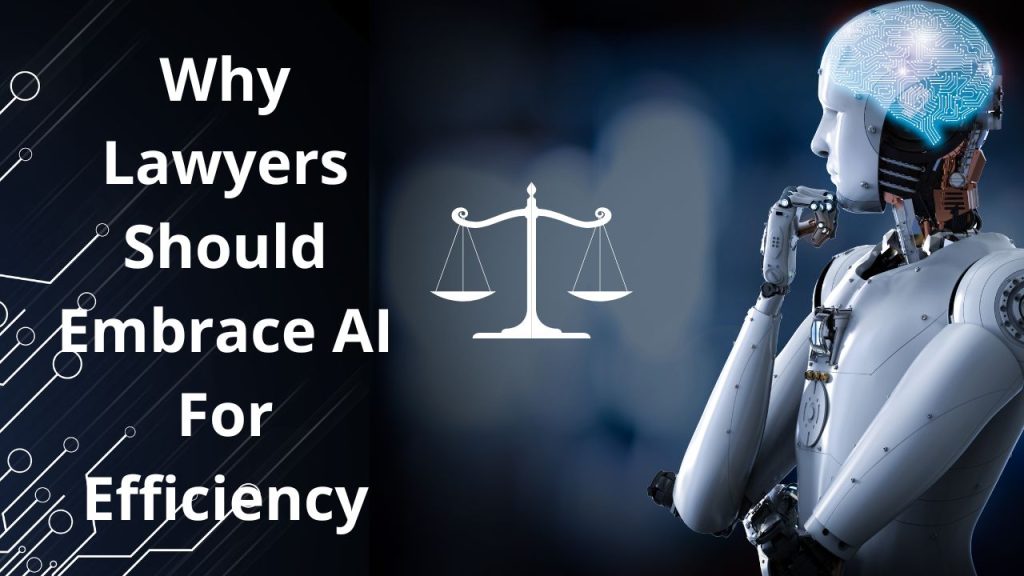In this article, we will delve into the realm of AI and explore how it can transform the practice of law, enhancing efficiency and driving remarkable results.
One of the most significant pain points for lawyers in the United States is the overwhelming volume of administrative tasks that they have to manage alongside their legal responsibilities.
The extensive paperwork, document management, scheduling, and other administrative duties can take up a substantial amount of their time, diverting their focus away from core legal work. This administrative burden often leads to reduced efficiency, increased stress levels, and challenges in providing timely and quality legal services to clients.
As a result, many lawyers are actively seeking solutions, such as AI-powered tools, to alleviate this pain point and enable them to dedicate more time to strategic legal analysis and client interaction.
According to a survey conducted by the American Bar Association, legal professionals reported a remarkable 30% increase in efficiency through the adoption of AI-powered tools.
Let’s delve into the fundamental definition of AI and its specific scope within the legal field.
Definition of AI and its Scope in the Legal Field
Artificial Intelligence refers to the simulation of human intelligence in machines that are programmed to think and learn like humans. In the legal context, AI is a powerful tool that leverages advanced algorithms and data analysis to tackle complex tasks traditionally performed by lawyers.
Let’s discuss the key AI technologies transforming the legal industry.
Key AI Technologies Transforming the Legal Profession
AI encompasses a range of technologies that are revolutionizing the legal profession. Let’s explore some of the key ones:
- Natural Language Processing (NLP): AI’s ability to understand and interpret human language is a game-changer for the legal industry. It enables efficient analysis of vast amounts of legal text, leading to faster and more accurate results.
- Machine Learning (ML): ML algorithms enable AI systems to continuously learn and improve from data, making them proficient in predicting case outcomes and highlighting legal insights that would otherwise remain hidden.
- Legal Analytics: By analyzing large datasets, AI-driven legal analytics platforms provide lawyers with valuable insights and trends, empowering them to make better-informed decisions and develop effective strategies.
- Expert Systems: These AI-powered systems replicate the expertise and knowledge of legal professionals, providing valuable guidance and advice to lawyers in real time.
- Robotic Process Automation (RPA): AI-driven automation streamlines repetitive and time-consuming tasks, such as document generation and data extraction, enabling lawyers to focus on more complex and strategic work.
Overcoming Traditional Challenges through AI Integration
Let’s discuss the traditional challenges lawyers face and how to overcome these challenges with AI integration.
1. Tedious Legal Research Made Effortless
One of the most time-consuming aspects of legal practice is conducting thorough research. AI technology has revolutionized this process, offering advanced search capabilities that navigate complex legal databases, extracting relevant information efficiently.
Additionally, AI systems can summarize and distill complex legal texts, saving lawyers precious time and effort.
AI also automates citation and case law analysis, reducing errors and enhancing the accuracy and comprehensiveness of legal research.
2. Streamlining Document Creation and Review
Legal professionals are no strangers to the arduous task of creating and reviewing countless documents.
A study by the American Bar Association found that lawyers spend an average of 60% of their time on tasks related to document review and management.
AI-powered document drafting tools utilize machine learning algorithms to generate accurate and reliable legal documents in a fraction of the time it would take a human. These tools also analyze contracts, ensuring compliance and minimizing the risk of errors.
Moreover, AI simplifies due diligence processes by swiftly sifting through vast amounts of data and identifying pertinent information, thereby streamlining the overall workflow.
3. Enhancing Predictive Analytics and Decision Making
AI’s ability to predict case outcomes is instrumental in strategic planning and risk assessment. By leveraging machine learning algorithms, lawyers can gain valuable insights into potential outcomes and make data-driven decisions.
AI systems excel at identifying relevant patterns and legal insights that might otherwise be overlooked, enabling lawyers to better strategize their approach.
Improved decision making, fueled by AI, allows lawyers to efficiently allocate resources, provide more accurate legal advice, and ultimately increase their chances of success.
4. Ethical Considerations and Data Privacy
Lawyers encounter the dual difficulty of upholding ethical standards and ensuring data privacy while integrating AI within their practice.
Addressing Concerns Surrounding Data Privacy and Security
When integrating AI into the legal practice, data privacy and security concerns must be given utmost importance. Implementing robust cybersecurity measures ensures the protection of sensitive client data from potential breaches.
Moreover, complying with privacy regulations such as the General Data Protection Regulation (GDPR) and the California Consumer Privacy Act (CCPA) is vital to maintain ethical standards and safeguard client information.
Anchoring AI Systems Within Legal Ethics
Transparency, fairness, and accountability are crucial when using AI in the legal profession. Lawyers must ensure that AI systems are programmed to uphold ethical standards and comply with legal obligations. Human oversight and responsibility in AI-supported decisions and advice remain essential to maintain trust and avoid potential biases or errors.
Challenges in Adoption of AI and How to Overcome Them
Let’s discuss the challenges lawyers face in adopting AI into their practice and how to overcome them.
1. Resisting AI Implementation due to Fear and Misconceptions
Lawyers may be hesitant to embrace AI due to fears of job displacement or misconceptions about its limitations. Educating them about the true capabilities and limitations of AI is essential in dispelling these fears. Sharing successful case studies, showcasing the return on investment, and highlighting the tangible benefits of AI adoption can help lawyers overcome their reservations.
2. Navigating Organizational and Cultural Barriers
Introducing AI into an organization can face resistance due to cultural or organizational barriers. Implementing training programs and upskilling initiatives will empower lawyers to embrace AI and adapt to the evolving landscape.
Promoting a culture of innovation and collaboration fosters an environment where AI integration can thrive, ultimately benefiting both the legal professionals and their clients.
3. Addressing Concerns About Job Displacement
Contrary to popular belief, AI is not meant to replace lawyers but rather to augment their capabilities. Lawyers should view AI as a tool that enhances their work, enabling them to focus on more critical and specialized tasks.
By positioning themselves as AI integrators and strategists, legal professionals can leverage the power of AI to provide more comprehensive and efficient legal services.
The Promise of the Future: AI in Dispute Resolution and Legal Services Delivery
In an era marked by technological advancements, the integration of AI offers a transformative potential that is revolutionizing both dispute resolution methods and the accessibility of legal services, promising a future where efficiency and inclusivity prevail.
AI-Augmented Mediation and Arbitration Processes
The implementation of AI in dispute resolution processes brings numerous advantages. AI’s capacity to handle and process vast datasets significantly streamlines conflict resolution. It enables more efficient negotiations by analyzing patterns, identifying precedents, and suggesting fair settlements. Ultimately, AI can revolutionize the way legal professionals facilitate mediation and arbitration, saving time and resources.
AI-Enabled Legal Services for Underserved Populations
One of the most promising aspects of AI in the legal field is its potential to increase access to justice for underserved populations. Automated legal support systems powered by AI can provide cost-effective solutions for legal aid organizations. These systems empower individuals to navigate legal processes, receive essential guidance, and access critical legal information, democratizing legal services.
Conclusion
Embracing AI in the legal practice holds immense benefits for lawyers and their clients alike. By fully utilizing AI technologies, legal professionals can streamline their work processes, enhance efficiency, and ultimately deliver better outcomes.
Lawyers who embrace and leverage AI will find themselves better equipped to navigate complexities and provide high-quality, innovative legal services.
Contents
Frequently Asked Questions
Most frequent questions and answers
AI has transformed many industries including the law. However, lawyers will not be fully replaced. AI excels in tasks like document review, legal research, and contract analysis. However, the human element remains crucial for complex legal reasoning, negotiation, empathy, and creative problem-solving. AI will be used by lawyers to improve efficiency, accuracy and client service.
Lawyers can ensure ethical use of AI by:
- Understanding AI capabilities and limitations.
- Regularly auditing AI systems for biases and accuracy.
- Ensuring AI-augmented decisions are reviewed by legal professionals.
- Transparently disclosing the use of AI to clients.
- Adhering to established legal ethics and professional standards in AI implementation.
AI will reshape legal education by incorporating technology-focused courses. Future lawyers will need to understand AI’s role, potential, and ethical implications. Professional development will include training on AI tools to enhance research, analysis, and client service. Continuous learning about AI trends will be essential for staying relevant in the evolving legal landscape.
The future of AI in law holds immense promise:
- Document automation will streamline routine tasks.
- AI-driven legal research will provide quick, accurate insights.
- Predictive analytics will aid in case outcome forecasting.
- Virtual assistants will manage administrative tasks.
- AI-powered dispute resolution tools may emerge.
- Cross-border collaboration will improve with language translation.
- Law firms will become data-driven, informed by AI insights.
As the legal industry adapts to AI’s transformative potential, lawyers who embrace and leverage AI will find themselves better equipped to navigate complexities and provide high-quality, innovative legal services.



